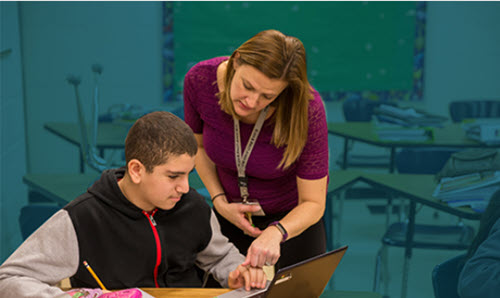PORTLAND, Ore., Dec. 22, 2021 /PRNewswire/ — NWEA — a not-for-profit, research and educational services provider serving K-12 students — today released new research that illustrates the scale and disproportionate nature of the disruption in student learning resulting from the COVID-19 pandemic. The research, Learning during COVID-19: An update on student achievement and growth at the start of the 2021-22 school year, is the third in a series of research briefs by NWEA focused on understanding how the pandemic has affected student reading and mathematics outcomes.
The research examined MAP Growth assessment scores from six million U.S. public school students in grades 3-8 from fall 2021 compared to students in the same grade in fall of 2019, the last quarter unaffected by COVID-19. The research found evidence of significant levels of unfinished learning, particularly in math, however, gaps between current achievement and pre-pandemic achievement have not increased since the end of 2020-21, which may indicate the impacts of the pandemic are stabilizing.
Key findings include:
- Student achievement at the start of the 2021-22 school year was lower compared to a typical year, with larger relative declines in math (9 to 11 percentile points) than reading (3 to 7 percentile points).
- Achievement was lower for all student groups in fall 2021; however, as our data have illuminated before, historically marginalized students and students in high-poverty schools were disproportionately impacted, particularly in the elementary grades studied.
- Student gains across the pandemic (from fall 2019 to fall 2021) lagged norms for pre-pandemic growth, especially in math.
- Normative growth trends across the pandemic varied by pre-pandemic achievement status; higher achievers made gains that were more consistent with projected normative growth, whereas lower-achieving students were more likely to fall short of growth projections.
The research findings offer further evidence highlighting the inequitable nature of unfinished learning across the pandemic and shine light on the groups and subject areas that should be targeted for additional support as COVID recovery efforts continue in the 2021-22 school year and beyond.
NWEA undertook this research in an effort to examine students’ academic progress at the start of the third school year impacted by the COVID pandemic so that educators and policymakers are equipped with the current evidence necessary to guide decisions and make adjustments where needed as part of COVID-19 recovery efforts.
“This latest research higlights that while students are back in classrooms it does not mean that all is back to pre-pandemic “normal” even though there are early signs of some stabilization. The ongoing impact continues to disrupt learning and, especially, hit our most vulnerable students,” said Chris Minnich, CEO of NWEA. “It is critical — now more than ever — that we direct funding where it is needed most and determine the necessary interventions to improve student outcomes, particularly for those who have suffered the greatest disruptions.”
The ongoing impact of the pandemic illuminates the urgency for education leaders to leverage data to understand the varied needs of their students and develop plans to spend their significant federal resources aligned with student need to local contexts. In addition, states and districts should be setting up data collection and reporting processes to understand which interventions are succeeding in improving student outcomes.
As previously announced, NWEA’s research team is part of the ” Road to Recovery” effort in collaboration with CALDER at the American Institutes for Research (AIR) and the Center for Education Policy Research (CEPR) at Harvard University, to help districts examine student achievement and learning gains in connection with COVID-19 recovery programs.
To learn more about the new research,
About NWEA
NWEA® (formerly known as Northwest Evaluation Association) is a mission-driven, not-for-profit organization that supports students and educators in more than 146 countries through research, assessment solutions, policy and advocacy services, professional learning and school improvement services that fight for equity, drive classroom impact and push for systemic change in our educational communities. Visit NWEA.org to learn more about how we’re partnering with educators to help all kids learn.


:max_bytes(150000):strip_icc()/Health-GettyImages-1333230386-993ef5fca5994b69bda4b5eab71bf89d.jpg)


